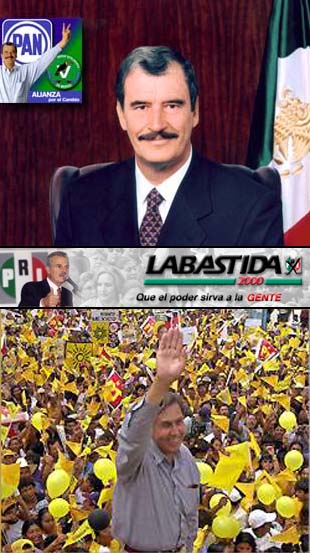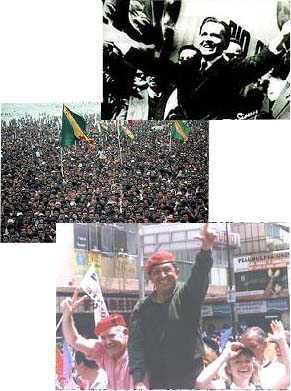REQUIRED
-
Michael Coppedge, "Parties and society in Mexico
and Venezuela: Why competition matters," Comparative Politics,
April 1993, 25 (3):253-271.
-
Robert H. Dix, "Democratization and the institutionalization
of Latin American political parties," Comparative Political Studies,
January 1992, 24 (4):488-521.
-
Scott Mainwaring and Timothy R. Scully, Building
Democratic Institutions: Party Systems in Latin America (Stanford:
Stanford University Press, 1995), p. 1-34, 459-74.
-
Peter Siavelis and Arturo Valenzuela, "Electoral
Engineering and Democratic Stability: The Legacy of Authoritarian
Rule in Chile," in Arend Lijphart and Carlos H. Waisman, eds., Institutional
Design in New Democracies: Eastern Europe and Latin America
(Boulder, CO: Westview, 1996), p. 77-100.
-
Gregory D. Schmidt, "Fujimori's 1990 Upset Victory
in Peru: Electoral Rules, Contingencies, and Adaptive Strategies,"
Comparative Politics, April 1996, 28 (3):321-54.
-
Alan Angell, Maria D'Alva Kinzo, and Diego Urbaneja,
"Latin America," in David Butler and Austin Ranney, eds., Electioneering:
A Comparative Study of Continuity and Change (Oxford: Clarendon
press, 1992): 43-68.
- Inter-American Development Bank, "Latin America
after a Decade of Reforms," Economic and Social Progress in Latin
America: 1997 Report (Johns Hopkins University Press, 1998), p.
120-1, 124-48.
RECOMMENDED
-
Scott Mainwaring and Matthew S. Shugart, "Conclusion:
Presidentialism and the Party System," in Scott Mainwaring and Matthew
S. Shugart, eds., Presidentialism and Democracy in Latin America
(New York: Cambridge University Press, 1997):394-437.
-
Karen L. Remmer, "The Political Economy of Elections
in Latin America," American Political Science Review, June
1993, 87 (2):393-407.
-
John D. Martz, "Party Elites and Leadership in
Colombia and Venezuela," Journal of Latin American Studies,
February 1992, 24 (1):87-121.
-
Robert H. Dix, "Cleavage Structures and Party Systems
in Latin America," Comparative Politics, October 1989, 22
(1):23-35.
-
Lawrence LeDuc, Richard G. Niemi, and Pippa Norris,
eds., Comparing Democracies: Elections and Voting in Global Perspective
(Thousand Oaks, CA: Sage, 1996), p. 13-48.
-
Barry Ames, "The Reverse Coattails Effect -- Local
Party Organization in the 1989 Brazilian Presidential Election,"
American Political Science Review, March 1994, 88 (1):95-111.
-
Scott Mainwaring and Timothy R. Scully, Building
Democratic Institutions: Party Systems in Latin America (Stanford:
Stanford University Press, 1995), p. 37-71, 100-99, 298-22, 399-458.
-
Silvio Waisbord, "Secular Politics: The Modernization
of Argentine Electioneering," in David L. Swanson and Paolo Mancini,
eds., Politics, Media, and Modern Democracy (Westport, CT:
Prager, 1996), p. 207-25.
-
Peter Siavelis, "Continuity and Change in the Chilean
Party System: On the Transformational Effects of Electoral Reform,"
Comparative Political Studies, December 1997, 30 (6):651-74.
-
Cesar Cansino, "Party government in Latin America:
theoretical guidelines for an empirical analysis," International
Political Science Review, April 1995, 16 (2):169-182.
-
Chappell Lawson, "Why Cardenas Won," in Jorge I.
Dominguez and Alejandro Poire, Toward Mexico's Democratization:
Parties, Elections, Campaigns, and Voters in Mexico (forthcoming).
-
John A. Booth and Mitchell A. Seligson, eds.,
Elections and Democracy in Central America (Chapel Hill,
University of North Carolina Press, 1995), p. 45-65, 84-102.
-
Scott Mainwaring, "Politicians, Parties, and Electoral
Systems: Brazil in Comparative Perspective," Comparative Politics,
October 1991, 24 (1):21-41.
- John D. Martz, "Electoral campaigning and Latin
American democratization: the Grancolombian experience," Journal
of Interamerican Studies and World Affairs, Spring 1990, 32 (1):17-43.
|

Campaigning in Mexico 2000: Vincente Fox, Labastida,
and Cardenas.

Luiz Carlos Prestes, leader of the
Brazilian communist party for over 35 years, a victorious Hugo Chavez,
and voters in one of the poorest areas of Recife, Brazil (1984)
attend a political rally celebrating the first Brazilian democratic
election in 25 years.
|
![]()
![]()
![]()
![]()
![]()